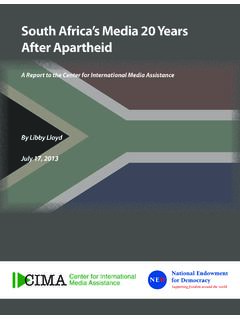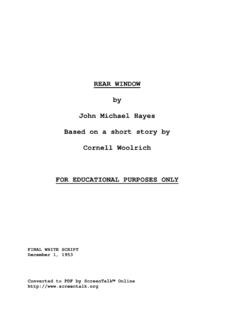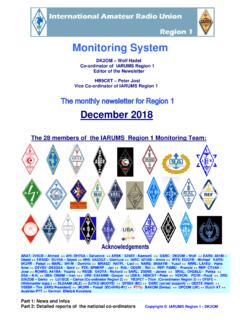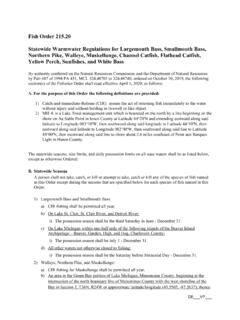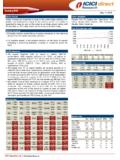Transcription of South Africa’s Media 20 Years After Apartheid
1 By Libby Lloyd July 17, 2013 South Africa s Media 20 YearsAfter Apartheid A Report to the Center for International Media Assistance The Center for International Media Assistance (CIMA), at the National Endowment for Democracy, works to strengthen the support, raise the visibility, and improve the effectiveness of independent Media development throughout the world. The Center provides information, builds networks, conducts research, and highlights the indispensable role independent Media play in the creation and development of sustainable democracies. An important aspect of CIMA s work is to research ways to attract additional private sector interest in and support for international Media development.
2 The Center was one of the of the main nongovernmental organizers of World Press Freedom Day 2011 in Washington, convenes working groups, discussions, and panels on a variety of topics in the field of Media development and assistance. The center also issues reports and recommendations based on working group discussions and other investigations. These reports aim to provide policymakers, as well as donors and practitioners, with ideas for bolstering the effectiveness of Media assistance. Marguerite H. SullivanSenior DirectorCenter for International Media Assistance National Endowment for Democracy 1025 F Street, , 8th Floor Washington, DC 20004 Phone: (202) 378-9700 Fax: (202) 378-9407 Email: and Layout by Valerie Popper #SouthAfrica 3 Libby LloydLibby Lloyd is a journalist and researcher on freedom of expression and Media policy.
3 She worked for both mainstream and alternative newspapers, radio stations, and magazines in South Africa in the 1980s and early 1990s and helped establish a journalists union, the Association for Democratic Journalists, during that period. She was the head of radio at a training institution, the Institute for the Advancement of Journalism, in the mid-1990s before moving into Media policy development. She has since worked for a number of the institutions mentioned in this report including as a member of the council of the Independent Broadcasting Authority; as the first CEO of a statutory funding organization, the Media Development and Diversity Agency; and as a member of one of the interim Boards of the South African Broadcasting Corporation.
4 Lloyd now works as a freelance researcher on freedom of expression and Media -related issues and policies. Among other things, she has conducted research into public broadcasting regulation in South Africa, funding models for community radio, the impact of the criminalization of journalism in Africa, Media codes for elections, and mainstreaming gender issues into ICT laws and policies. About the Author4 Center for International Media Assistance Table of ContentsPreface 5 Executive Summary 6 The State of the Media in South Africa 8 South Africa Today 10 Media Then 12 Media Now 13 Granting Media Development 28 A Brief History of Media Funding 29 General Funding Trends in South Africa 30 South
5 African Government Support for the Media 31 Other Local Funding 32 Support for Media in South Africa 33 European Funders of Media in South Africa 40 ` Future Funding 42 Conclusions and Recommendations 43 Endnotes 45 #SouthAfrica 5 PrefaceThe Center for International Media Assistance (CIMA) at the National Endowment for Democracy commissioned this report on the state of news Media in post- Apartheid South Africa.
6 South Africa s news Media has become, in the post-1994 democratic era, among the most concentrated in the world, affecting the quality of its content and the sales of its newspapers. A significant decrease in international development support, and post-1994 changes to the nature of that support, has exacerbated that process. The few cases in which dedicated, targeted support has been provided have, in sharp contrast, contributed to the development of islands of investigative journalism excellence able to exercise influence both on other Media and on broader South African is grateful to Libby Lloyd, a journalist and researcher on freedom of expression and Media -related issues and policies, for her research and insights on this topic.
7 We hope that this report will become an important reference for international Media assistance H. Sullivan Senior Director Center for International Media Assistance6 Center for International Media Assistance Is what was dubbed the miracle of the South African transition from Apartheid censorship to democracy and freedom of expression coming undone? Does the country now have the diverse and vibrant Media culture essential to any functioning democracy? How, if at all, have and other development agencies contributed to this? The answers to these questions are inevitably nuanced. Things are rarely black and white in any transition to democracy, and the Apartheid legacy of systematic underdevelopment and brutal silencing of the majority of citizens was not undone with the casting of the 1994 ballot nor with the signing of an internationally lauded constitution.
8 In the 1980s, independent anti- Apartheid newspapers launched with the assistance of international donors contributed toward exposing the brutality of Apartheid and to the eventual demise of the system. They played a critical role in informing South Africans and the international community about the government s violent crackdown on any resistance to its racist policies. However, while these papers successfully defied attempts by the Apartheid government to silence them under successive states of emergency, only one of them has survived the cuts in donor funding that accompanied the transition to democracy. Although there has been a dramatic growth in broadcasting with the freeing of the airwaves from state control, South African Media now almost two decades After the first democratic elections is one of the most concentrated in the world.
9 This, and the consequent focus by the big Media companies on profits over editorial quality and integrity, has limited citizens access to a wide range of in-depth news and analysis. In the meantime, international organizations such as Freedom House have downgraded South Africa s freedom of expression ratings in response to concerns about threatened new laws in South Africa. Judges and courts in the country, meanwhile, generally have defended critical principles relating to freedom of expression, setting important case law precedents on issues such as the importance of protecting journalists sources. The robust and at times very heated debates about such possible laws and what freedom of the Media and the rights to privacy and dignity really mean in practice are themselves, it is argued by some, essential growing pains of a new democracy and preferable to silence.
10 Donor support specifically for Media has in the meantime been limited since 1994 although Media projects have at times benefited from aid earmarked for other issues such as gender, health, and social justice. Information on Media support specifically is therefore difficult to track as very few funders maintain detailed, Executive Summary #SouthAfrica 7readily available data on how much support they have provided to the sector. As a result , this report on funding support for news Media in South Africa is more indicative of broad trends than statistically precise. The Open Society Foundation of South Africa part of George Soros s network of institutions seems to be the only private organization that has a dedicated program for Media , though organizations such as Atlantic Philanthropies have supported some news projects.

